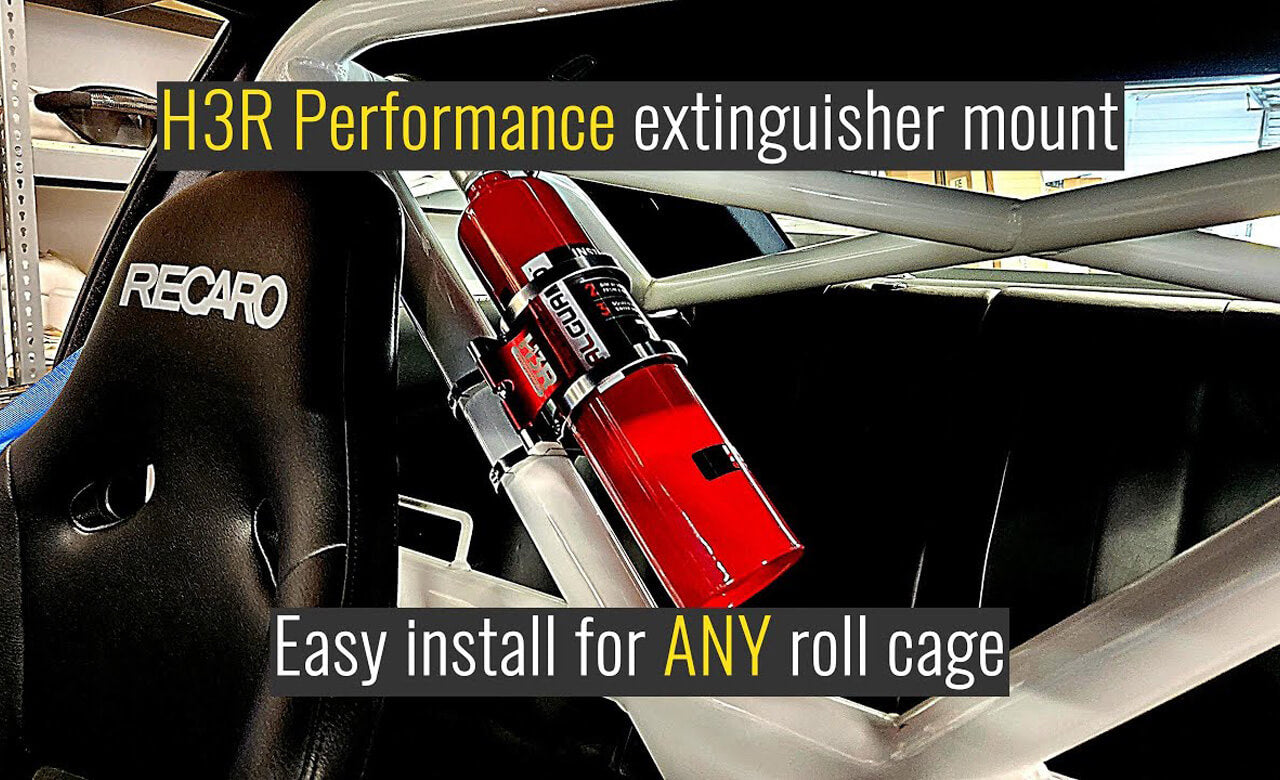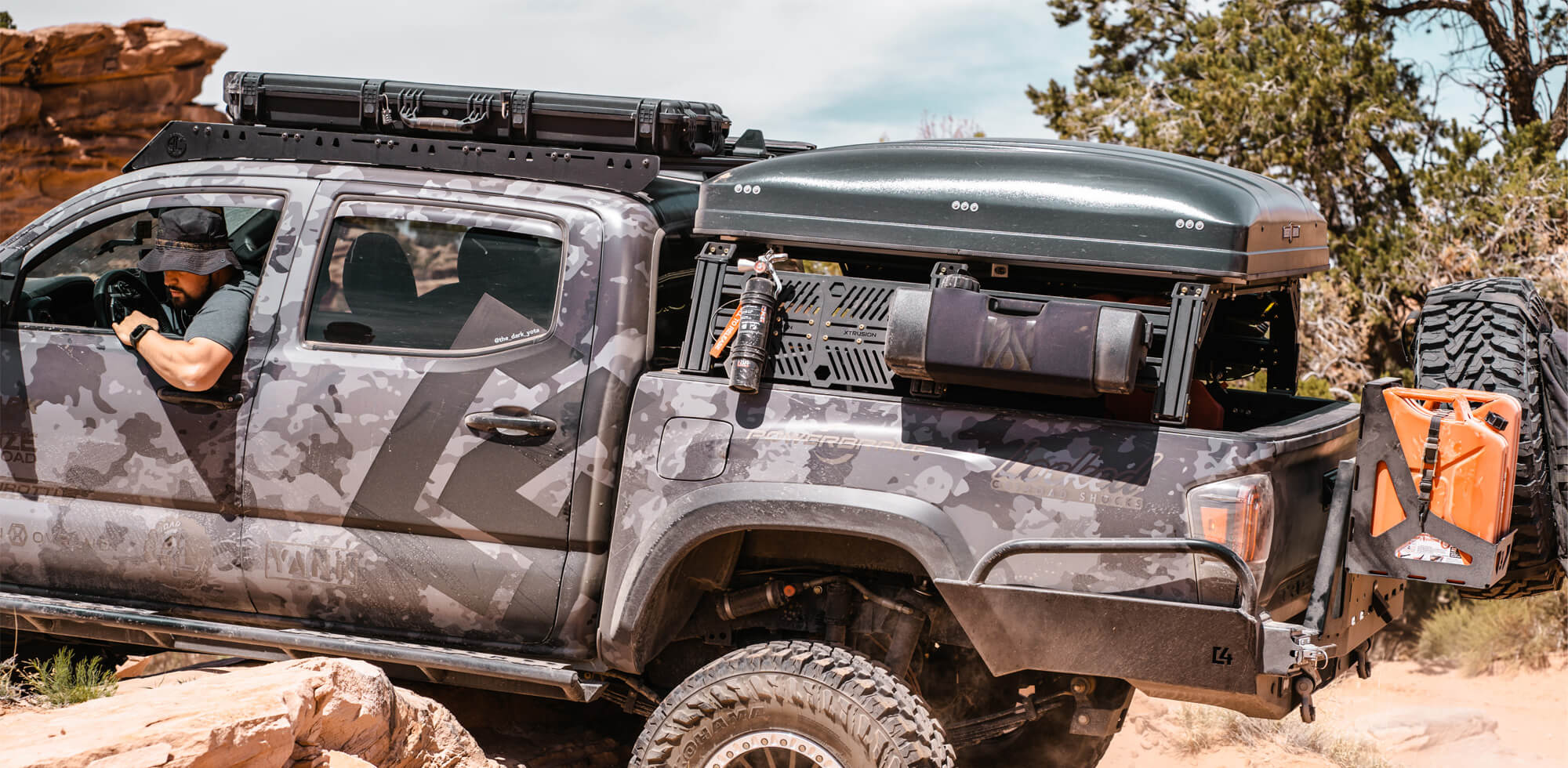Our special guest in this episode is Tim Pickering, an off-road enthusiast, and retired EMT and Flight Paramedic.
Tim was participating in an off-road event when his engine had a flash fire. Fortunately, he was prepared with an H3R Performance, clean agent HalGuard extinguisher and not only got the fire out FAST but was able to make a simple repair and complete the run, without any major engine damage.
Quick Look
Spectators: Fire! Fire!
Tim: Here, here, used the Halogen (HalGuard.)
Spectator: Yeah, that’s good!
Why Clean Agent HalGuard for your Build?
Tim: I had been looking for fire extinguishers. I am a retired emergency medical services professional and a flight paramedic. Being in aviation, I was very familiar with clean agent extinguishers versus ABC or powder extinguishers. I knew from my experience in emergency medical services that if we'd had an ABC extinguisher that corrosive powder would have been completely through my engine compartment on my electrical system, and we would have had to tow the vehicle out of the woods, and do a complete tear down to avoid damage.
Extinguisher tips for off-road
Making certain, one, it’s the right extinguishing agent. Two, it’s where you can easily get it, even with your eyes closed. Three, if you do any fire extinguisher training you ought to be somewhere in the range of 6 to 10 feet away from the fire, that's a problem with some competitive devices that are out there that you ought to be completely aware of when you do your research.
Advice for new off-road enthusiasts
Do your research. Spend some time understanding what the sport is and understand the investment. Understand how you have to be mechanically prepared, and mentally prepared. Because there are all levels of this of this particular sport, like there are any sport. So find a Jeep club that you like, or an off road group that you like. Engage with them, they're going to share, they're going to help you, they're going to mentor you.
Full Interview
Teresa:
Well, welcome everyone to fire talk. I'm very excited to be here today with Timothy Pickering who has a fantastic story and footage. So how are you doing Timothy?
Tim:
I'm good, thank you very much. Actually packing and getting ready to. Go on a Jeeping event tomorrow.
Teresa:
Oh, you're on a roll! So let's start by you telling us a little bit about yourself and how you got into doing these builds and off-road events.
Tim:
Well, long story short, I grew up in East Africa in the Middle East, did a tremendous amount of Overlanding with my father and my mother with Volkswagens, Land Rovers, and Suburbans, all the way through the late 70s. Then in the real world and intervened, had to work for a living.
About seven years ago my wife and I, as I was looking towards retirement, began to look at building an off-road camper. You can see that over my shoulder. And to go with it we wanted a Jeep to flat tow for Overlanding. That Jeep quickly became more than a flat tow Jeep, it is now what we would classify as, not the full on buggy, but you know an extreme off-road, rock climber type Jeep. We actually have a separate Jeep we use for Overlanding now because this one is not. 
So that's how we got to where we are. In about 2017, when we took delivery of Tiger the camper, I began looking for fire extinguishers. I'm a retired emergency medical services professional and a flight paramedic and a bunch of other stuff, so I'm very cognizant of safety and safety preparation. Being in aviation, I was very familiar with clean agent extinguishers versus ABC or powder extinguishers. And so I was looking for those and did a bunch of research and quickly found H3R. Found a lot of very good reviews, a lot of quality points on your website as well as independent testing. And so I purchased actually two. I purchased a 100 (HG100C), and then tiger the camper has a 250 (HG250R) in it, so we make sure that we're prepared with a clean agent extinguisher.
Teresa:
Why don't we go and talk about what happened when you used it.
Tim:
So we were in Killbuck, Ohio at the Jeep Jamboree USA there, and it was the 2nd obstacle of the first day on Friday. And the obstacle is called 37th heaven. Third up into the second lead and came down hard. We had done an upgrade, which changed our steering from power steering to a hydraulic assist steering mechanism. It turned out that a pressure relief line that goes to a valve was crimped and it let go as I came down, sprayed hot hydraulic fluid onto the engine and the engine manifold, which caused a flash fire, and as you will see in the video, pretty spectacular. You immediately hear “Fire, fire, fire!” and ABC fire extinguishers start coming out of the woodwork. But between the seats on the quick release is my H3R (extinguisher.) So I am stabilizing the vehicle, getting shut down, and yelling halogen “Halogen halogen!” Which I meant HalGuard. That stopped the ABC’s, so I handed it out the window, and you'll see in the video the hood is up and we have the second ignition. It ignited once it put itself out because there is no oxygen. We open the hood, of course that oxygenated the fire and it flared back up. Squirted it once and then they squirted it twice, and put the fire completely out. The only damage it did in the engine compartment was burn a dust cover off the air intake, and I completed the next day and a half of the event with no problems.
I knew from my experience in emergency medical services that if we'd had an ABC extinguisher that corrosive powder would have been completely through my engine compartment and my electrical system. My concern with that then is well, this has an expensive Corvette engine. As well as a sophisticated electrical system associated with all the controls that we have, we would have had to tow the vehicle out of the woods and do a complete tear-down to avoid damage. So, thanks to my investment in the H3R-100 here, one, my life was saved. So you know I didn't have a fire inside the passenger department. Two, the vehicle was saved, and three, we didn't cause any property damage in the property that we were on because if you get a big fire going, we were in the trees on a hillside. It would have been extremely difficult to put. Because I believe in the product, you know, I believed in it when I bought it.
Teresa:
You said you guys just had to make the repairs, you didn't have to clean anything up from the extinguisher.
Tim:
Exactly! Literally, I had a spare dust cover I put it back on, we moved that line. We obviously did some changes to the engine compartment to completely move that line. We actually put a shield that forces any blow-off down and out of the engine compartment.
But making certain that we had the right extinguishing agent ready to use. So, you know, one, it's the right extinguishing agent. Two, it's where you can easily get it even with your eyes closed. All I have to do is reach behind me and pull a pin and I can grab it. The understanding that a fire extinguisher actually, and unfortunately the guide the spotter, does lean over and points it very close to the fire. You really don't need to. You know with the fire extinguisher, if you do any fire extinguisher training, you ought to be somewhere in the range of 6 to 10 feet away from the fire. That's a problem with some competitive devices that are out there that you ought to be completely aware of when you do your research. But having those three things you know in your mind, in the ready, it's part of your mechanical and mental preparation for engaging in any sport you know, much less high performance off-road.
Teresa:
I think having that muscle memory too and practicing is always good advice.
Tim:
That's the thing I can't stress enough for people. I’m not a worry wart, I'm not, you know, OCD about planning, but this is your life and the people around you's life. So do that little bit. Don't just jump in and go “Oh I got a fire extinguisher in the back.” Do you know where it is? Can you reach it? Can you use it? Those are kind of the three tenants that I would stress.
Teresa:
Speaking of advice, say someone wanted to get into what you're doing. What kind of advice would you give a newcomer?
Tim:
Do your research. Spend some time understanding what the sport is. If you're already involved, understand how to expand what you're doing, if that's what you want to do. Because there are all levels of this of this particular sport like there are any sport. From Overlanding, which we engage in, versus the rock crawling and extreme operations.
You need to understand the investment, because actually, these aren't a cheap thing to do. Now many people are good with their own hands and can build.
Understand how you have to be mechanically prepared and mentally prepared. You talked about muscle memory, you know. Sit in the vehicle and understand where your switch is and what they do. Close your eyes, can you touch them? Can you reach them? Do you know what your shift pattern is? Those kinds of things.
Now, at the basic level of off-roading in Jeeps and Jeeping, you don't need an exotically equipped vehicle to enjoy the sport. There are all levels, and they stock Jeep, or very minimally equipped or built-up Jeep is very capable of doing a tremendous amount of things. In fact, probably more capable than you are mentally.
So find a Jeep club that you like or an off-road group that you like. Engage with them. They're going to share, they're going to help you, they're going to mentor you. They're going to give you advice, and you have to filter advice because everybody does have a thought about what's the right advice. Read, there's a tremendous amount of material out there. Watch YouTube, do your research on fire extinguishers.
But being prepared for your mechanical breakdowns being prepared for fire, and finally, if you're Overlanding, be being prepared for survival. I mean every one of our vehicles carries a basic Survival kit. If we break down somewhere, we have a way to eat, we have fire, and we have water, and we have shelter. And those are the kinds of things that I think will make you enjoy the sport more. Build relationships that allow you to share and as well as enjoy the company of people. I highly recommend for Jeepers to become involved or consider going to Jeep Jamboree USA. You can check their website they operate all over the US. They're very well coordinated event. Finally, Jeep clubs as I've talked about, and Jeep parks. Southern Missouri Off-road Ranch is where we're going tomorrow. It's kind of our Home Park for our home club, which is Midwest Jeep Thing. And I work a lot with folks at Axel Boy off-road, because that's generally where Cub, which is the name of this Jeep, videos are posted, and people can find what we're doing.
Teresa:
One thing I hear, time and again, from people involved in, you know, going off-road and Overlanding is the sense of community that you can find.
We appreciate you sharing all this with us and I think it will be immensely helpful to people.
So the next thing I just wanted to ask is. What's next for you?
Tim:
This is, like I said, Cub and cub got a lot of upgrades. In fact, I would tell you after it's fourth version upgrade, the only original Jeep parts are actually the frame, the body, and the brake pedal. Because everything; seats, console, everything has been changed and rebuilt. So one would say gosh, what else can you do? Well, there's always some level of upgrade. We were in Pennsylvania as well as went back to Kilbuck and I conquered 37 heaven in one shot this year. So very, very happy to have done that. And we blew out our control arms and control arm bushings. The control arms keep the axle in line and underneath the spring, so we've already got upgraded control arms that have been delivered and just waiting for this event that I'm going to this weekend to be over. 
When you start modifying things, you must expect that it's a continuing investment. It’s unfortunate that you know things just don't stay static, but when you think about the forces that you exert on the vehicle we're going to damage them.
We've got some Jeep Jamborees that we're thinking of for next year. We go to the Outer Banks of North Carolina regularly, and then Utah and Colorado. And actually, we'll be in Texas in late December camping with our other Jeep so we have a busy schedule.
Teresa:
Well, you are certainly making the most of your retirement, Tim. Now are you on Social media at all?
Tim:
I'm on Instagram as @tpickering2020 and then a lot of stuff is posted on a site called Axle Boy Trail Life, the build shop that I work with. They'll take my stuff and put it up on their Instagram and their Facebook page.
The Offroad Camper has its own Facebook page Tiger Trail and sometimes Cubs in there, but more the other Jeep called Mouse is more in there. We tend to name our vehicles, it's easier than saying the LJ, the JK, or the tiger. So tiger, cub, and mouse are our three off-road vehicles.
Teresa:
Thank you so much for taking the time to share and talk with us. We really appreciate it and best of luck to you on your next event, be well!
Tim:
Thank you for making it possible for me to continue to do this without having to completely rebuild my vehicle!
If someone, one person, can learn, and save themselves first, their vehicle second, and the environment they're in third, we've done a great thing.






